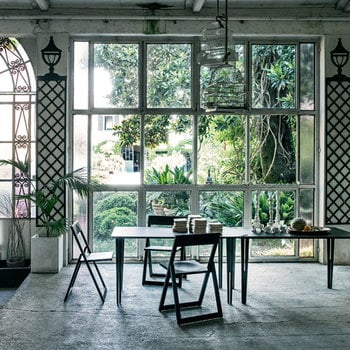Marc Berthier designed the foldable Aviva chair in 1979 as a response to the mobile, urban lifestyle. Italian Magis has manufactured the original Aviva chair for over twenty years and started the production of the updated design in 2010. As Aviva folds flat, it’s easy to move from one room and home to another. Made of simple beech elements, the minimalist chair will stand the test of time.
Aviva chair, black
Magis
Description
Marc Berthier designed the foldable Aviva chair in 1979 as a response to the mobile, urban lifestyle. Italian Magis has manufactured the original Aviva chair for over twenty years and started the production of the updated design in 2010. As Aviva folds flat, it’s easy to move from one room and home to another. Made of simple beech elements, the minimalist chair will stand the test of time.
Product details (6)
- Colour
- Black
- Width
- 47 cm
- Depth
- 42 cm
- Height
- 80 cm
- Seat height
- 46 cm
- Material
- Painted beech
- Product ID
Designer
Marc Berthier (b. 1935) is a French designer and architect and one of the founders of the Eliumstudio, which opened in Paris in 2002. Berthier’s style is characterized by modern functionalism with colourful international flavours. Some of his customers include Lexon from France, Dé Signe from Japan and Magis from Italy, with whom he has collaborated for over 30 years.
Berthier’s designs have been selected for the permanent collections of museums such as New York’s MoMA and the Musée National d’Art Moderne in Paris, and he has been awarded twice with the prestigious Compasso d’Oro award.
View all productsReviews (0)
Sustainability
The Product Sustainability Framework, our criteria of sustainable design, helps you find the most sustainable products in our selection. Read below which sustainability criteria this product has met.
Working conditions & labour 9/9
-
Equal opportunities for all employees
-
Commitment to UN Global Compact, fair compensation for all employees
-
Corporate responsibility requirements defined and communicated for suppliers
-
Systematic work for improved inclusion and well-being in the workplace
-
Transparent supply chain
-
Suppliers' compliance to a code of conduct ensured
-
Direct suppliers audited and certified
-
Compliance to the UN Guiding Principles on Business and Human Rights ensured in the supply chain
-
Support for community involvement in the supply chain
Eco-friendly production 7/9
-
Fair and resource-wise water-use in production
-
No incineration or landfilling of returned items
-
No use of endangered species as materials
-
No direct environmental emissions or waste (excl. GHGs) from production
-
Material-efficient and ecological packaging
-
Positive impact on nature’s well-being through operations that regenerate natural ecosystems
-
No potentially harmful chemicals used in own production
-
The sustainability of direct suppliers' production is addressed and monitored
-
Production and material sourcing that respect biodiversity, animal rights, and natural ecosystems
Climate impact 5/8
-
Company's direct greenhouse gas emissions identified and commitment to reduction
-
Product's carbon impact identified and commitment to reduction
-
Guidance on energy- and eco-efficient use of the product
-
Contribution to climate initiatives beyond the brand’s direct operations
-
100 % renewable energy in own production and operations
-
Low-carbon or compensated transportation
-
Carbon footprint of the product calculated and goals set to reduce it
-
Carbon neutral or carbon negative product
Sustainable materials 6/6
-
Sustainable and long-lasting material choices
-
No harmful or hazardous substances
-
Responsible raw material sourcing and production
-
Materials suited for circularity: monomaterials, recyclable finishings, renewable or recycled contents etc.
-
Ecological materials: natural, biodegradable, recyclable or recycled contents
-
Outstanding materials in terms of innovativeness, responsibility, sustainability and circularity: local production or sourcing, 100 % recycled content, C2C-certification etc.
Circular design 4/5
-
High aesthetic quality promoting long-term use of the product
-
Technically durable product design and material choices
-
Design for enduring life-long quality
-
Design and support for product maintenance, repair and upgradability
-
Innovative circular design solutions: circular service system, resale platform, remanufacturing, collection of used products, etc.









